
John J. Mellencamp, previously known as Johnny Cougar, John Cougar, and John Cougar Mellencamp, is an American singer-songwriter. He is known for his brand of heartland rock, which emphasizes traditional instrumentation. He was inducted into the Rock and Roll Hall of Fame in 2008, followed by an induction into the Songwriters Hall of Fame in 2018.
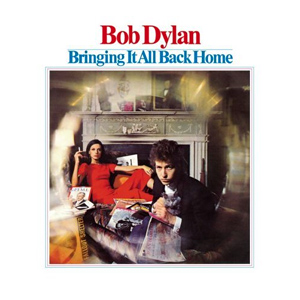
Bringing It All Back Home is the fifth studio album by the American singer-songwriter Bob Dylan, released in March 1965 by Columbia Records. In a major transition from his earlier sound, it was Dylan's first album to incorporate electric instrumentation, which caused controversy and divided many in the contemporary folk scene.

The Times They Are a-Changin' is the third studio album by the American singer-songwriter Bob Dylan. It was released on February 10, 1964, through Columbia Records. Whereas his previous albums, Bob Dylan and The Freewheelin' Bob Dylan, combined original material and cover songs, this was the first to feature only original compositions. The album consists mostly of stark, sparsely arranged ballads concerning issues such as racism, poverty, and social change. The title track is one of Dylan's most famous; many feel that it captures the spirit of social and political upheaval that characterized the 1960s.
"The Lonesome Death of Hattie Carroll" is a topical song written by the American musician Bob Dylan. Recorded on October 23, 1963, the song was released on Dylan's 1964 album The Times They Are a-Changin' and gives a generally factual account of the killing of a 51-year-old African-American barmaid, Hattie Carroll, by then 24-year-old William Devereux "Billy" Zantzinger, a young man from a wealthy white tobacco farming family in Charles County, Maryland, and of his subsequent sentence to six months in a county jail, after being convicted of assault.

Phranc, is an American singer-songwriter whose career began playing in several bands in the late 1970s Los Angeles punk rock scene. Her musical style later shifted during the 1980s as a solo artist, into a self-proclaimed "All-American Jewish lesbian folksinger."
"My Back Pages" is a song written by Bob Dylan and included on his 1964 album Another Side of Bob Dylan. It is stylistically similar to his earlier folk protest songs and features Dylan's voice with an acoustic guitar accompaniment. However, its lyrics—in particular the refrain "Ah, but I was so much older then/I'm younger than that now"—have been interpreted as a rejection of Dylan's earlier personal and political idealism, illustrating his growing disillusionment with the 1960s folk protest movement with which he was associated, and his desire to move in a new direction. Although Dylan wrote the song in 1964, he did not perform it live until 1988. However, during his 1978 tour, his band played a brief instrumental version of it as Dylan took the stage.
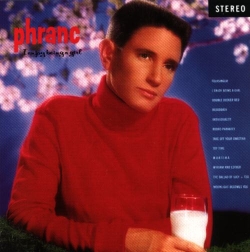
I Enjoy Being a Girl is an album by the American musician Phranc, released in 1989. She supported the album with a North American tour.
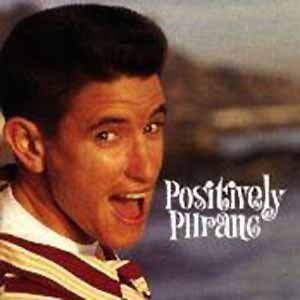
Positively Phranc is an album by the American musician Phranc, released in 1991. Phranc promoted the album by touring with Morrissey. Phranc was dropped by Island Records after the album's release.

Milkman is an album by the folk singer-songwriter Phranc, released in 1998. It was her first album in seven years; she had spent several years putting on her Neil Diamond tribute act, Hot August Phranc.

"Hurricane" is a protest song by Bob Dylan co-written with Jacques Levy and released as a single in November 1975. It was also included on Dylan's 1976 album Desire as its opening track. The song is about the imprisonment of boxer Rubin "Hurricane" Carter (1937–2014). It compiles acts of racism and profiling against Carter, which Dylan describes as leading to a false trial and conviction.
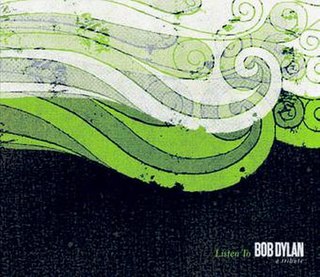
Listen to Bob Dylan: A Tribute is a tribute album, dedicated to Bob Dylan. The two disc set was released on August 16, 2005 by Drive-Thru Records. Despite the record label's reputation for its emo/pop punk roster, the compilation album contained cover versions kept close to the originals, instead of pop punk renditions of the songs.
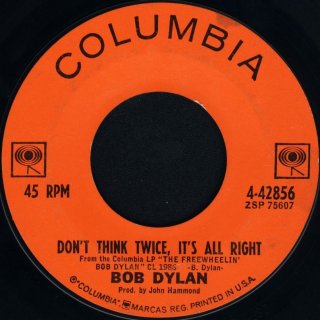
"Don't Think Twice, It's All Right" is a song written by Bob Dylan in 1962 and released the following year on his album The Freewheelin' Bob Dylan and as the B-side of the single "Blowin' in the Wind". The song has been covered by several other artists, including Waylon Jennings in 1964, Susan Tedeschi, Emilie-Claire Barlow in her 2010 album The Beat Goes On and Peter, Paul and Mary, who released it as a single, which reached the Top 10 of the Billboard Hot 100.
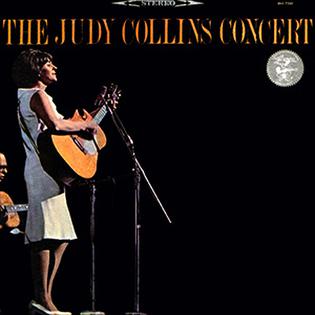
The Judy Collins Concert is a 1964 live album by American singer and songwriter Judy Collins, which included combined traditional folk material with songs by Bob Dylan and Tom Paxton. It was recorded on March 21, 1964 at the Town Hall in New York City.
"Song to Woody" was written by American singer-songwriter Bob Dylan and released on his debut album, Bob Dylan, in 1962. The song conveys Dylan's appreciation of American folk legend Woody Guthrie. The song is one of two original compositions featured on Dylan's debut album. Dylan also rehearsed the song in a country arrangement during sessions for Self Portrait on May 1, 1970, as heard on the 2021 compilation album 1970.

By 1965, Bob Dylan was the leading songwriter of the American folk music revival. The response to his albums The Freewheelin' Bob Dylan and The Times They Are a-Changin' led the media to label him the "spokesman of a generation".
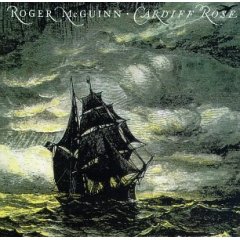
Cardiff Rose is a solo studio album by American singer/songwriter and ex-The Byrds frontman Roger McGuinn, released in 1976. The album, produced by Mick Ronson, was recorded on the heels of Bob Dylan's Rolling Thunder Revue 1975 tour, in which both McGuinn and Ronson had participated. Other key members of the Rolling Thunder Revue were primary contributors: David Mansfield, Rob Stoner, Howie Wyeth, and lyricist Jacques Levy. Levy had previously co-written "Chestnut Mare" with McGuinn, and collaborated with Dylan on the album Desire.

The Bob Dylan England Tour 1965 was a concert tour by American singer-songwriter Bob Dylan during late April and early May 1965. The tour was documented by filmmaker D. A. Pennebaker, who used the footage of the tour in his documentary Dont Look Back.
Kirk P. Kelly is a folk singer, songwriter and labor activist from New York City. In the mid-1980s Kelly and a group of like-minded musicians started calling themselves "anti-folk" and started a small but intense movement. Kelly's music has been infrequently recorded over the years. His work has often included topical songs. Some of Kelly's early songs dealt with the labor movement and were based upon his own work experience. A decade or so after starting his musical career Kelly was accepted to and attended an AFL-CIO organizer's training school and began working throughout the United States as a union organizer.

"Lay Down Your Weary Tune" is a song written by Bob Dylan in 1963. Dylan originally recorded it for his album The Times They Are a-Changin', but his version of the song was not officially released until 1985 on the Biograph box set. In the album liner notes, Dylan claims that in the song he was trying to capture the feeling of a Scottish ballad he had just heard on a 78 rpm record. The specific ballad Dylan was referring to has not been identified, but speculation includes "The Water Is Wide", "O Waly, Waly" and "I Wish, I Wish".
"You're Gonna Make Me Lonesome When You Go" is a song by Bob Dylan. Recorded in September 1974, it appeared as the fifth track on Dylan's album Blood on the Tracks, released in January 1975.















